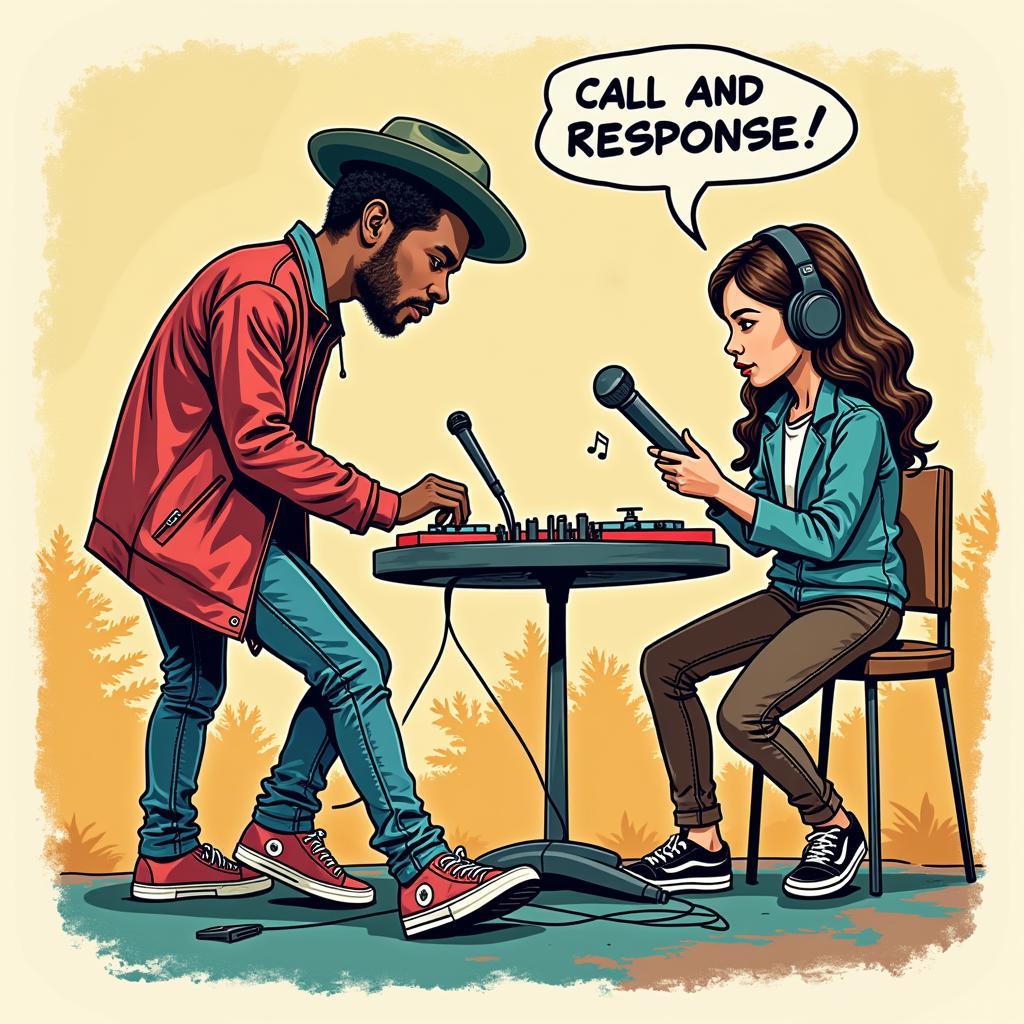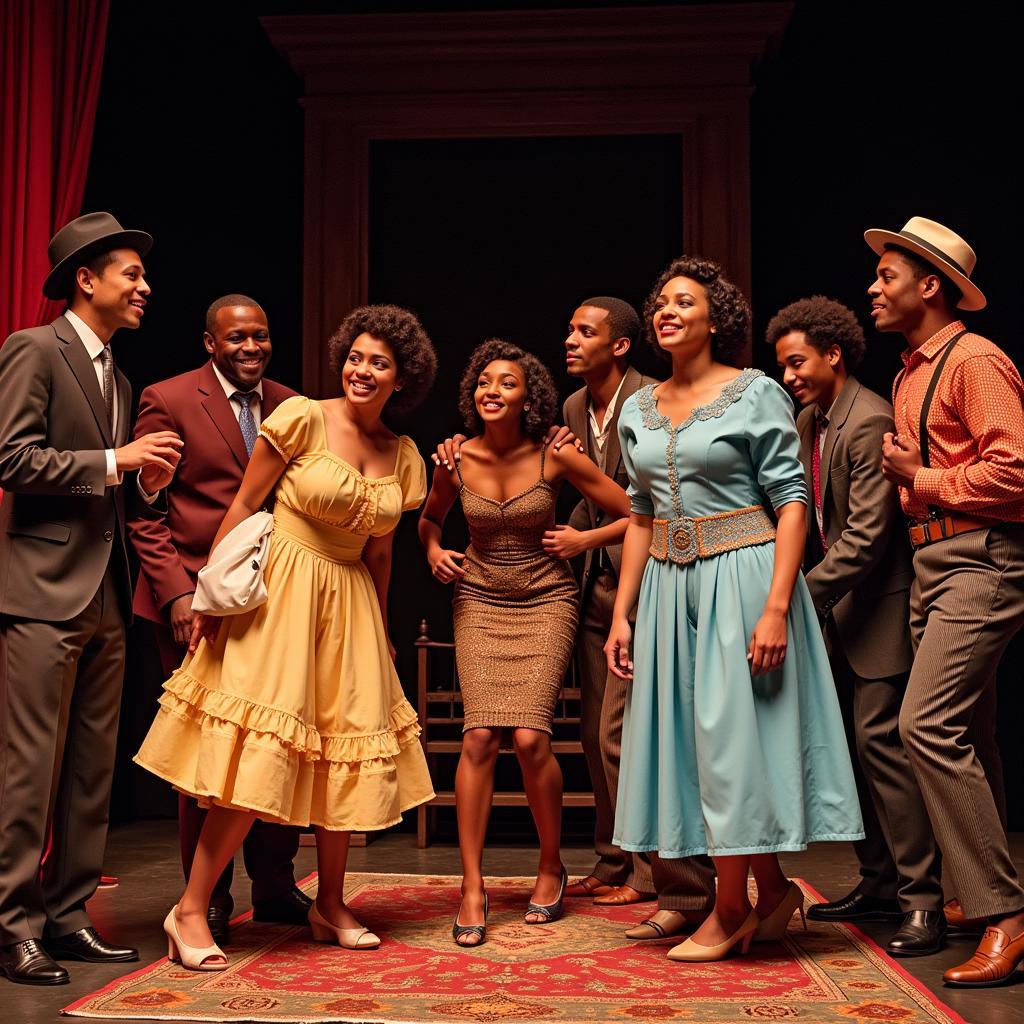The Power and History of African American Call and Response Songs
African American Call And Response Songs are a vibrant and essential part of African American musical heritage. Rooted in the experiences of enslaved Africans, these songs evolved as a powerful form of communication, resistance, and spiritual expression. This article delves into the rich history, significance, and enduring impact of this unique musical tradition.
A History Forged in Sorrow and Hope: Understanding the Origins of Call and Response
African American call and response songs originated during the harrowing period of slavery in the United States. Denied basic freedoms and subjected to brutal conditions, enslaved Africans found solace and strength in music. These songs became a vital means of communication in the fields, allowing them to coordinate tasks, share stories, and express their emotions. african american negro spirituals and slave songs often incorporated call and response patterns, serving as a powerful form of coded communication.
The Role of the Griot in African Musical Traditions
The roots of call and response can be traced back to West African musical traditions. Griots, the traditional storytellers and musicians, employed this technique to engage their audiences and transmit history and cultural knowledge through song. This tradition was carried across the Atlantic during the transatlantic slave trade, becoming a cornerstone of African American music.
What Makes Call and Response Unique? Examining the Structure and Significance
Call and response is characterized by a musical dialogue between a leader (the caller) and a group (the responders). The caller sings a phrase or poses a question, and the responders answer with a complementary phrase or response. This dynamic exchange creates a sense of community and participation, fostering a powerful connection between performers and listeners. african american songs frequently utilize this structure, reflecting the communal nature of African American musical expression.
The Spiritual Power of Call and Response: From Fields to Churches
Call and response also played a crucial role in the development of spirituals, which served as both religious hymns and coded messages of hope and resistance. The call and response format allowed enslaved Africans to express their faith, share their struggles, and communicate their yearning for freedom in a veiled manner. This musical tradition continued to evolve in the post-slavery era, becoming an integral part of African American church services.
Call and Response in Modern Music: A Legacy of Influence
The influence of call and response extends far beyond traditional spirituals. It has permeated various genres of African American music, including gospel, blues, jazz, and hip-hop. Artists like James Brown, Aretha Franklin, and numerous hip-hop performers have incorporated this dynamic element into their music, demonstrating its enduring power and versatility. african american soul music owes a significant debt to this tradition, as it often features dynamic vocal exchanges between lead singers and backing vocals.
Preserving a Rich Heritage: The Importance of Understanding Call and Response
Understanding African American call and response songs is essential for appreciating the depth and complexity of African American musical history and culture. These songs tell stories of resilience, faith, and the ongoing struggle for equality. By studying and celebrating this tradition, we honor the legacy of those who created it and ensure its continued vitality for future generations. african american pulpit often incorporates this vibrant style of engagement, demonstrating its power to connect with audiences and deliver powerful messages.
 Modern Interpretation of Call and Response Music
Modern Interpretation of Call and Response Music
Conclusion: The Enduring Power of African American Call and Response Songs
African American call and response songs are more than just music; they are a testament to the human spirit’s ability to find strength and hope in the face of adversity. This tradition continues to inspire and uplift, reminding us of the power of music to connect us, empower us, and preserve our shared cultural heritage. african folk music history provides valuable context for understanding the origins and evolution of this powerful musical form.
FAQ
- What is the main purpose of call and response songs?
- How did call and response contribute to communication among enslaved Africans?
- How does call and response manifest in contemporary music genres?
- What is the significance of the griot in the context of call and response?
- Why is it important to study and preserve this musical tradition?
- How are call and response songs used in religious settings?
- Can you give examples of famous artists who use call and response in their music?
Need further assistance? Contact us at Phone: +255768904061, Email: kaka.mag@gmail.com or visit us at Mbarali DC Mawindi, Kangaga, Tanzania. We have a 24/7 customer support team.




